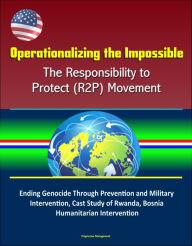Operationalizing the Impossible: The Responsibility to Protect (R2P) Movement - Ending Genocide Through Prevention and Military Intervention, Cast Stu
by Progressive Management
2020-04-23 16:24:18
Operationalizing the Impossible: The Responsibility to Protect (R2P) Movement - Ending Genocide Through Prevention and Military Intervention, Cast Stu
by Progressive Management
2020-04-23 16:24:18
This excellent report has been professionally converted for accurate flowing-text e-book format reproduction. Genocide is a complex phenomenon that has a long and dark history. The contemporary concept of the Responsibility to Protect (R2P) seeks to ...
Read more
This excellent report has been professionally converted for accurate flowing-text e-book format reproduction. Genocide is a complex phenomenon that has a long and dark history. The contemporary concept of the Responsibility to Protect (R2P) seeks to rid the world of this murderous practice through prevention and in some cases military intervention. It seeks to accomplish this monumental task by changing the language of intervention and prevention from right to responsibility. Since R2P's inception in 2001, it has gained political momentum both domestically and internationally pushing the concept further towards a norm. However, the complex phenomenon of genocide or mass atrocity has carried on in human history to the present. Because it possesses both complexity and a rich yet dark history, it has survived many linear political solutions that seek its demise. The durability of this violent social interaction begs the question: will R2P work?R2P is a holistic concept. This means that any weakness in a part of the concept calls the idea's feasibility into question. This monograph examines the military intervention aspect of R2P through one simple question: what are the operational challenges associated with military interventions under R2P? First, this work examines the phenomenon of genocide and the history of political, moral, and philosophical thought that underpin R2P. Second, is a comparative case study of the Rwandan and Bosnian interventions utilizing naturally paired elements of operational art in order to gain an understanding and appreciation for operational challenges associated with interventions into mass atrocities. Finally, a comparison between the case study findings and observations from the examination of the phenomenon of genocide and the exploration of the political, moral, and philosophical underpinnings of R2P provide relevant conclusions to the primary research question.Ultimately, this monograph suggests that the greatest operational challenge associated with military interventions under R2P is in fact the concept itself. R2P removes the state's right to choose when faced with an intervention into a complex and uncertain environment. As such, states tend to avoid acknowledging ongoing atrocities due to the legal obligations inherent in the language of R2P. This means that a concept designed to bring primacy to genocide prevention is actually pulling political focus further away from it through risk aversion. So, is R2P operationalizing the impossible or is there another way to rid the world of the all too often occurrence of genocide and mass atrocity? This researcher suggests that in order to answer this question much more discourse is required before normalizing R2P.
Less














 Site.jpg)















